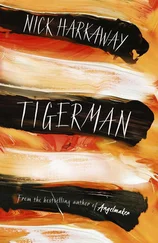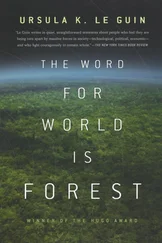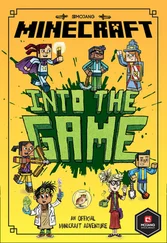Nick Harkaway - The Gone-Away World
Здесь есть возможность читать онлайн «Nick Harkaway - The Gone-Away World» весь текст электронной книги совершенно бесплатно (целиком полную версию без сокращений). В некоторых случаях можно слушать аудио, скачать через торрент в формате fb2 и присутствует краткое содержание. Жанр: Фантастика и фэнтези, Фэнтези, на английском языке. Описание произведения, (предисловие) а так же отзывы посетителей доступны на портале библиотеки ЛибКат.
- Название:The Gone-Away World
- Автор:
- Жанр:
- Год:неизвестен
- ISBN:нет данных
- Рейтинг книги:4 / 5. Голосов: 1
-
Избранное:Добавить в избранное
- Отзывы:
-
Ваша оценка:
- 80
- 1
- 2
- 3
- 4
- 5
The Gone-Away World: краткое содержание, описание и аннотация
Предлагаем к чтению аннотацию, описание, краткое содержание или предисловие (зависит от того, что написал сам автор книги «The Gone-Away World»). Если вы не нашли необходимую информацию о книге — напишите в комментариях, мы постараемся отыскать её.
The Gone-Away World — читать онлайн бесплатно полную книгу (весь текст) целиком
Ниже представлен текст книги, разбитый по страницам. Система сохранения места последней прочитанной страницы, позволяет с удобством читать онлайн бесплатно книгу «The Gone-Away World», без необходимости каждый раз заново искать на чём Вы остановились. Поставьте закладку, и сможете в любой момент перейти на страницу, на которой закончили чтение.
Интервал:
Закладка:
So we stopped hunting for lost socks and packing bags, and fretting that we’d somehow miss the starting gun, and settled in to Mrs. Flynn’s provender. After a while we got quietly chatty and talked about small domestic chores, like cleaning gutters and chasing bats out of the loft. When the phone did ring (any time now), we could go and be heroes and save the world, which was Gonzo’s favourite thing, and perforce something I did from time to time as well. Until it kicked off, we might as well not fuss. And then the Nameless Bar went quiet again; in little groups and one by one we fell silent as we beheld a vision of awful destiny.
The vision took the form of a small child carrying a snot-crusted and elderly teddy bear. It marched out into the room with much gravitas, surveyed us all sternly, then turned to Mrs. Flynn the Barman to gather in details for the prosecution.
“Why was it all dark?” it demanded.
“The power went out,” Mrs. Flynn the Barman said cheerfully. “There’s a fire.” The child glowered around the room.
“These are loud men,” it said, still annoyed, “and this one is dirty.” It indicated Gonzo, who winced. It considered Sally Culpepper.
“This lady has a flower on her back,” it added, having found conclusive proof of our unsuitability, then sat down in the middle of the floor and helped itself to a cheese and bacon roll. We goggled at it, and tried to make it go away by rubbing our eyes.
“Sorry,” Mrs. Flynn the Barman said to us in general. “We don’t let him in here normally, but it’s an emergency.” She eyed the child without approval. “Sweetie, you can’t eat that; it’s been on the floor near the dirty man.”
Gonzo would probably have objected to this, but he didn’t seem to hear her; he was still gazing in mute horror at the kid in front of him, and so was I, and so was everyone else. It was unquestionably a human toddler, and from the context certain conclusions had to be drawn which were uncomfortable and even appalling. This infant, swaddled in a bath towel and presently attempting to jam a four-inch-diameter granary bap into one ear, was the Spawn of Flynn.
Now, the fire on the Jorgmund Pipe was deeply unsettling. It represented danger and opportunity and almost certainly deceptions and agendas and what all. It was, however, well within our common understanding. Things burned, things exploded, and then we came along and made them stop. A breeding population of Flynns was another proposition altogether. We looked on Flynn as our personal monster, a safe, disturbing ogre of corrosive profanity and sinister glassware. He was ours and he was mighty and we grew great by association with him, and proof of his dangerous overmanliness was to be found in his fearless sexual trystings with the vasty Mrs. Flynn, but we didn’t really want to live in a world entirely composed of Flynn-like beings in their serried ranks, vituperative and grouchy and unwilling to take an IOU. That was a new order even the bravest of us would find inhospitable, and the glimmer of it, the Spawn of Flynn, was even now throwing pieces of mushed-up cheese at Gonzo’s boot. Mrs. Flynn the Barman, oblivious, finished whatever domestic task she was about amid a flurry of folding cloths and wiping, and trotted out. The Spawn of Flynn blithely ignored his mother and took a chomp from the side of the soiled roll.
“Crunchy,” said the Spawn of Flynn.
Sally Culpepper’s phone made a little chirrup, and everyone pointedly didn’t look.
“Culpepper,” Sally murmured, and then, after a moment, snapped it shut. “Wrong number.” We all made faces to suggest we weren’t fussed.
For a while, the Nameless Bar was filled with the sound of a small child eating and a lot of rough and tough-talking men and women thinking perturbed and unfamiliar thoughts about time and mortality and family. Then the quiet was broken, not by a phone call but by a sound so deep it was very nearly not a sound at all.
You heard it first as a kind of aggressive quiet. The whoosh and snarl of the desert all around us was still going on, but somehow it was subsumed by this deep, bass silence. Then you could feel it as a coldness in your knees and ankles, an unsteady, heart-attack feeling of weakness and vibration. A bit later it was audible, a thrumming gnognognogg which echoed in your lungs and let you know you were a prey animal today. And if you’d ever heard it before you knew what it was, and we all knew, because when we’d first met it was the noise we’d made together: the sound of soldiers. Someone was deploying a decent-sized military force around the Nameless Bar, and that meant they were emphatically not kidding about security. Since it seemed unlikely that they were deploying in order to arrest us, and since in any case if they were there would be absolutely nothing we could do about it, we all crowded through the big pine door of the Nameless Bar to watch them arrive.
Outside, it was cold and dry. The night had set in, witching-hour black, and the sands had given up their heat, so a chill wind was gusting across the wooden rooftops of the bar and the outbuildings, and the gloomy shacks and clapboard homes which made up the no-hope town of Exmoor, pop. 1,309. Off against the brow of Millgram’s Hill was our section of the Jorgmund Pipe; a single shadow-grey line lit by Flynn’s bedroom window and the work light in the paddock, and every now and again by the gleam of another lonely little house along the way. It ran in both directions into the dark, and somewhere on the other side of the globe those two lines met and joined, surely at a place which was as vibrant and alive as Exmoor was not. On the top of the Pipe, every few metres, there was a little nozzle spraying good, clean FOX into the sky; FOX, the magic potion which kept the part of the world we still had roughly the same shape day by day. No one quite knew where it came from or how you made it; most people imagined some big machine like an egg with all manner of wires and lights condensing it out of air and moonshine, and drip-drip-dripping it into big vats. There were thousands of them, somewhere, vulnerable and vital, and let them never stop. I’d once seen some of the machinery involved: long black lozenges with curved sides, all plumbing and hoses, and rather eerie. Less an egg than a space capsule or a bathyscaphe, except this was the opposite; not a thing for journeying through a hostile place, but a thing which makes what is outside less hostile.
Most people tried very hard to avoid noticing the Pipe. They had euphemisms for it, as if it were cancer or impotence or the Devil, which it was. In some places they painted it bold colours and pretended it was an art project, or built things in front of it or even grew flowers on it. Only in pissant remora towns like this one did you get to see the thing itself; the rusty and despised spine of who we were, carrying vital solidity and safety, and the illusion of continuance, to every nook and cranny of the Livable Zone.
In truth it was not a loop at all, but a weird bird’s-nest tangle. There were hairpin bends and corkscrews, and places where subsidiary hoses jutted out from the main line to reach little towns on the edges, and places where the Livable Zone pulled close about the Pipe like a matron drawing up her skirts to cross a stream, where the weather and the lie of the land brought the outside perilously close; but taken all together it made a sort of rough circle girdling the Earth. A place to have a home. Get more than twenty miles from the Pipe ( Old JP, they called it in Haviland City, where the Jorgmund Company had its headquarters, or sometimes the Big Snake or the Silver ) and you were in the inimical no-man’s-land between the Livable Zone and the bloody nightmare of the unreal world. Sometimes it was safe, and sometimes it wasn’t. We called it the Border, and we went through it when we had to, when it was the only way to get somewhere in any reasonable length of time, when the alternative was a long drive around three sides of a square and the emergency wouldn’t wait. All the same, we went in force and we went quickly, lightly, and we kept an eye on the weather. If the wind changed, or the pressure dropped; if we saw clouds on the horizon we didn’t like, or strange folks, or animals which weren’t quite right, we turned tail and ran back to the Pipe. People who lived in the Border didn’t always stay people. We carried FOX in canisters, and we hoped it would be enough.
Читать дальшеИнтервал:
Закладка:
Похожие книги на «The Gone-Away World»
Представляем Вашему вниманию похожие книги на «The Gone-Away World» списком для выбора. Мы отобрали схожую по названию и смыслу литературу в надежде предоставить читателям больше вариантов отыскать новые, интересные, ещё непрочитанные произведения.
Обсуждение, отзывы о книге «The Gone-Away World» и просто собственные мнения читателей. Оставьте ваши комментарии, напишите, что Вы думаете о произведении, его смысле или главных героях. Укажите что конкретно понравилось, а что нет, и почему Вы так считаете.












